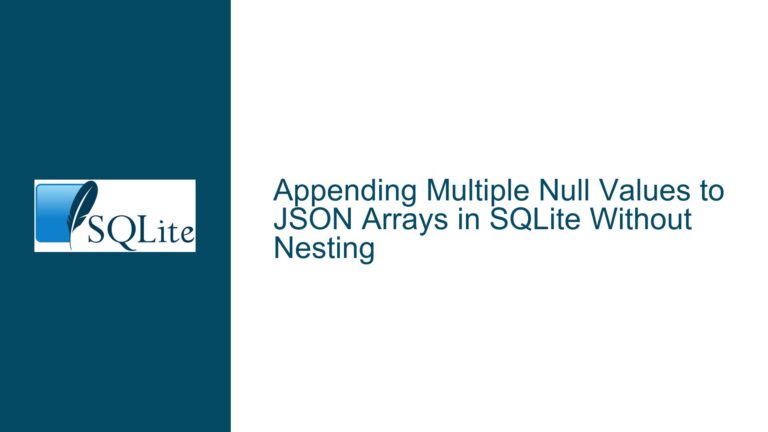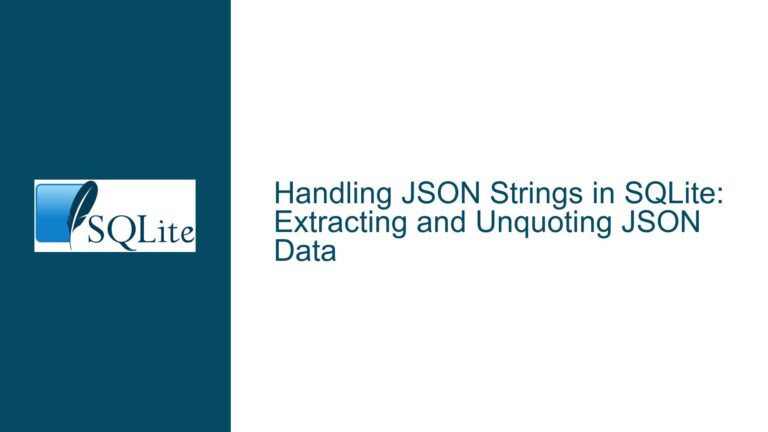SQLite EXC_BAD_ACCESS Crash in Virtual Table Handling
SQLite Crash During Query Preparation with Virtual Tables
The core issue revolves around a crash in SQLite, specifically an EXC_BAD_ACCESS error, which occurs during the preparation of a query involving virtual tables. The crash manifests in SQLite versions 3.27.0 through 3.31.1 and is triggered by a specific query that interacts with virtual tables. The error occurs when SQLite attempts to dereference a pointer that has been invalidated, leading to a memory access violation. This issue is particularly problematic because it occurs during the query preparation phase, meaning that the database does not need to contain any data for the crash to occur. The crash is reproducible with a specific schema and query, which will be detailed later in this post.
The crash log indicates that the fault occurs in the isAuxiliaryVtabOperator function, where SQLite attempts to access the pLeft and pRight members of an Expr structure. The pLeft pointer is dereferenced without a prior check to ensure it is valid, leading to the EXC_BAD_ACCESS error. This suggests that the issue is related to how SQLite handles expressions involving virtual tables during query optimization.
The problem has been identified and fixed in SQLite version 3.32.0, which introduces additional checks to ensure that pointers are valid before they are dereferenced. However, for users who are unable to upgrade to the latest version due to production constraints, understanding the root cause and potential workarounds is crucial.
Invalid Pointer Dereference in Virtual Table Expression Handling
The crash is caused by an invalid pointer dereference in the SQLite code responsible for handling expressions involving virtual tables. Specifically, the issue arises in the isAuxiliaryVtabOperator function, which is part of SQLite’s query optimization process. This function is designed to determine whether an expression involves a virtual table and, if so, to prune the expression tree to optimize the query.
In the problematic versions of SQLite (3.27.0 through 3.31.1), the function does not perform adequate checks to ensure that the pLeft and pRight pointers are valid before dereferencing them. This oversight can lead to a situation where an invalid pointer is dereferenced, causing a memory access violation. The issue is exacerbated by the fact that the crash occurs during the query preparation phase, meaning that the database does not need to contain any data for the crash to occur.
The root cause of the invalid pointer dereference is related to how SQLite handles expressions involving virtual tables. In the problematic versions, the code assumes that the pLeft and pRight pointers are always valid when they are dereferenced. However, this assumption is not always true, particularly when dealing with complex queries involving virtual tables. The fix in SQLite 3.32.0 introduces additional checks to ensure that the pointers are valid before they are dereferenced, thereby preventing the crash.
The issue is particularly problematic for users who are unable to upgrade to the latest version of SQLite due to production constraints. In such cases, understanding the root cause and potential workarounds is crucial. One potential workaround is to avoid using queries that involve virtual tables in a way that triggers the bug. However, this is not always feasible, particularly in complex applications where virtual tables are used extensively.
Implementing Pointer Validation and Query Optimization Fixes
The most effective solution to this issue is to upgrade to SQLite version 3.32.0 or later, where the bug has been fixed. The fix introduces additional checks to ensure that the pLeft and pRight pointers are valid before they are dereferenced. This prevents the invalid pointer dereference that leads to the EXC_BAD_ACCESS error.
For users who are unable to upgrade to the latest version of SQLite, there are several potential workarounds that can be implemented to avoid the crash. One approach is to modify the queries that trigger the bug to avoid using virtual tables in a way that causes the invalid pointer dereference. This may involve rewriting the queries to use different expressions or to avoid certain types of joins that are known to trigger the bug.
Another potential workaround is to use a different version of SQLite that does not exhibit the bug. As noted in the discussion, SQLite versions 3.25.0 and 3.26.0 do not crash with the problematic schema and query. However, this approach may not be feasible for all users, particularly those who rely on features that are only available in later versions of SQLite.
In addition to these workarounds, it is important to ensure that the database schema and queries are optimized to avoid potential issues with virtual tables. This may involve reviewing the schema to ensure that it is designed in a way that minimizes the risk of invalid pointer dereferences. It may also involve reviewing the queries to ensure that they are written in a way that avoids complex expressions involving virtual tables.
Finally, it is important to monitor the database for any signs of corruption or other issues that may be related to the bug. This may involve regularly checking the database for errors and ensuring that backups are taken regularly to minimize the risk of data loss in the event of a crash.
In conclusion, the EXC_BAD_ACCESS crash in SQLite is caused by an invalid pointer dereference in the code responsible for handling expressions involving virtual tables. The issue has been fixed in SQLite version 3.32.0, but for users who are unable to upgrade, there are several potential workarounds that can be implemented to avoid the crash. By understanding the root cause of the issue and taking appropriate steps to avoid it, users can minimize the risk of encountering this bug in their applications.






